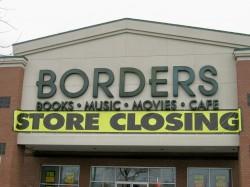 Borders Group is going out of business. Finally. Fully. There is no last-minute white knight to save what's left of the second-largest book retailer in the country.
Borders Group is going out of business. Finally. Fully. There is no last-minute white knight to save what's left of the second-largest book retailer in the country.
Sadly, some 10,700 employees will lose their jobs over the next two and a half months as the company closes its remaining 399 stores, two-thirds of which are superstores.
The end came yesterday, when the company said that because there is no "formal proposal from a going concern bidder," it does not need to have an auction today and can instead present the bid to liquidate to the judge on Thursday. Closing sales may begin as soon as this Friday. The last stores are expected to close by the end of September.
The liquidators are Hilco and Gordon Brothers, who made a bid of between $252 million and $284 million. In a statement, Borders Group president Mike Edwards said, "Following the best efforts of all parties, we are saddened by this development. We were all working hard towards a different outcome, but the headwinds we have been facing for quite some time, including the rapidly changing book industry, e-reader revolution, and turbulent economy, have brought us to where we are now."
In a statement, Borders Group president Mike Edwards said, "Following the best efforts of all parties, we are saddened by this development. We were all working hard towards a different outcome, but the headwinds we have been facing for quite some time, including the rapidly changing book industry, e-reader revolution, and turbulent economy, have brought us to where we are now."
He added, "I extend a heartfelt thanks to all of our dedicated employees and our loyal customers."
The end game in bankruptcy court may yet be messy. Only yesterday, for example, Kobo filed papers in court objecting to a variety of elements of what at the time was a probable liquidation. The e-reader maker and e-book seller with roots in Canada said that the "hurried and confusing sale process... leaves parties such as Kobo uninformed as to precisely what will be sold or how the Debtors intend to proceed with the potential assignment of unexpired leases and executory contracts." Kobo said that it has the right of first refusal on the sale of Borders's 11% stake in Kobo, and that confidential data cannot be sold.
And the Texas comptroller objected to Borders's motion to liquidate because it doesn't contain a requirement that the liquidators of Borders pay federal and state tax, Bloomberg reported. The comptroller said that in a liquidation of a Delaware company conducted by Hilco and Gordon Brothers, some $2 million in sales tax went unpaid.
With the Borders collapse, Barnes & Noble will be the only national bookstore chain. It and other book retailers will now undergo a second thumping as a result of bargain-basement pricing at 399 bookstores around the country. Publishers and other suppliers who have sold only COD to Borders will not be hit in the same way they were in February, when the company simply stopped payment of what it owed at that point.
The mass closings recall warnings of some in the business in the 1990s who feared that the chain superstores then sweeping the country and putting many independent booksellers out of business would someday themselves close and leave many communities without bookstores.
Still, based on what happened earlier this year, remaining booksellers near Borders anticipate some sales gains once the closing sales end. For example, sales at the Next Chapter Bookshop, Mequon, Wis., have risen 20% since May when a nearby Borders went out of business. Owner Lanora Hurley told the New York Times: "Everybody was saying those customers are going to go online. But there's still a market for print books, and I'm happy to see that that is flowing to an independent bookstore. I've got lots of new customers."
Some independent booksellers mourned the loss of another bookseller--and particularly the mass layoffs--reflecting a softening of attitudes toward Borders and Barnes & Noble in the era of e-books and Amazon.
But others felt differently. Linda Bubon, co-owner of Women and Children First, Chicago, Ill., said, "Now we have this behemoth off our backs. It's not the politic answer to say that inside, there's a little happy bookseller who's jumping up and down."
Publishers lamented the loss of a significant sales channel. "When you lose literally miles of bookshelves, it's going to have an impact," David Young, CEO of Hachette, told the Wall Street Journal. "I hope other retailers will now step up and make offers for what they consider to be the prime sites. It's a tragedy Borders didn't make it through."
And Morgan Entrekin, president and publisher of Grove/Atlantic, told the Times, "It saddens me tremendously because it was a wonderful chain of bookstores that sold our books very well. It's part of the whole change that we're dealing with, which is very confusing."
---
After filing for Chapter 11 bankruptcy reorganization five months ago, Borders spent the spring closing more than 240 stores and scrambling to convince publishers and other suppliers that it had a plan to remain in business. Again and again publishers, who had been severely burned by the bankruptcy filing and did not want to get stiffed again, were disappointed by the plans presented by Borders management.
When Borders decided to sell or liquidate it found an apparent savior in the Najafi Cos., which made an offer to buy the company for $215 million and the assumption of $220 million in debt with the intention of keeping at least part of it as an ongoing business. But landlords and the unsecured creditors committee objected because Najafi had the option to shut down as many stores as it wanted--and if it liquidated Borders, the creditors would gain less money than if it were liquidated by Hilco and Gordon Brothers. Najafi agreed to change the terms of the bid to satisfy creditors if publishers would agree to sell to Borders under normal terms. Reportedly one major publisher would not go along with the change, and the deal collapsed.
Many observers have found all kinds of people to blame and myriad reasons for Borders's collapse. The culprits include the growth of e-readers and e-books; the popularity of Amazon; customers who liked to lounge and browse at Borders but didn't buy much there; the Great Recession; and a series of strategic missteps at Borders, including outsourcing its website to Amazon in 2001.
To our mind, the single-largest factor for Borders's chronic problems were to be found at the corporate level--starting with the unhappy merger of Borders and Walden and including, over time, the "category management" program, a revolving door of top executives and few people with book experience--all of which were exacerbated when control of the company was taken by hedge fund manager Bill Ackman and corporate raider Bennett LeBow. For more on what happened at the company, see our article "Borders Missteps Go Back 20 Years," published February. --John Mutter

